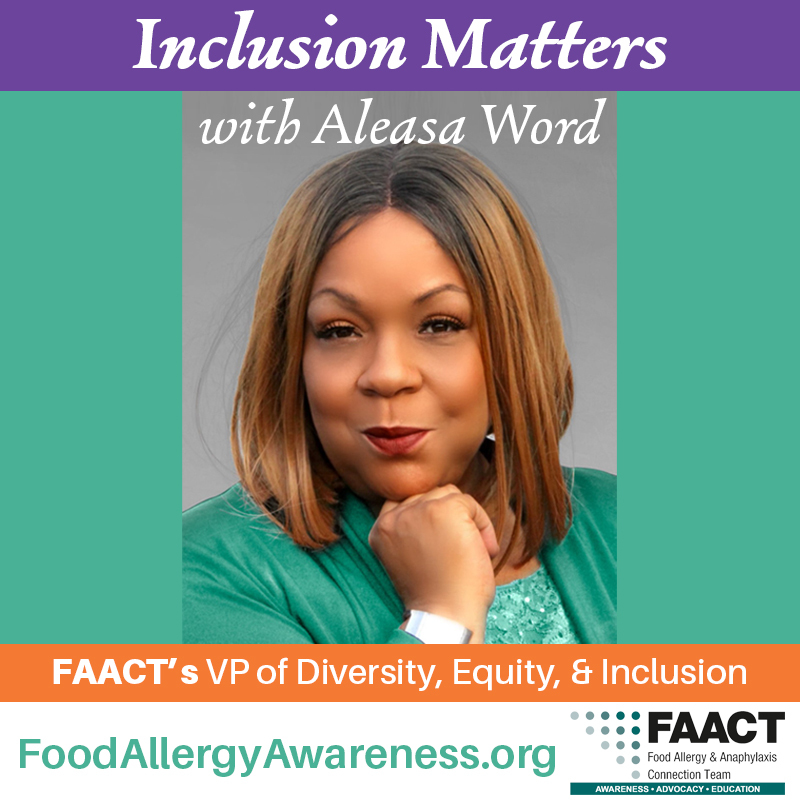My Family, My Choice: Respecting Differences When Living with Food Allergies
Subcategories

My Family, My Choice: Respecting Differences When Living with Food Allergies
by Aleasa Word, FAACT Vice President of Diversity, Equity, and Inclusion
August 2024
Years ago, a woman who was very much into the latest medical treatments told me all about what she was planning to do with her child to help them start to tolerate their allergens. She was very excited about new things on the horizon. In our family, the newer options were not suitable for a number of health reasons. Although I celebrated this mother’s excitement, I couldn’t help but feel her judgement about the decision I made regarding my family. I remember feeling like I had to explain the complexity of issues that prevented us from traveling the same path.
Then I realized that I didn’t have to explain anything to this person. As a caregiver, I had every right to do my own research and make the best choice for my family. I made some general comment like, “to each his/her own and I’m happy that works for you.” She pushed on until I finally told her I didn’t feel I needed to give an explanation about a private health matter. At that point, she quieted down. However, I could see the judgement in her face.
The biggest lesson for me was that there is truly no one-size-fits-all approach to managing food allergies. The choices families make to navigate food allergies vary widely, influenced by personal preferences, economic status, cultural background, and medical advice. Some families opt for strict avoidance, while others explore options like oral immunotherapy (OIT). Some feel comfortable eating out with careful questioning of wait staff, while others prefer to avoid restaurants entirely. Understanding and respecting these differences is crucial for fostering a supportive and inclusive community.
Economic factors often play a significant role in the decisions families make regarding food allergy management. OIT, for example, can be expensive for some people and may not be covered by all insurance plans. The costs associated with regular doctor visits, testing, and the therapy itself can be prohibitive for some families. Consequently, these families might opt for strict avoidance as a more economically feasible option.
As for those who opt to dine out, this can depend on access to restaurants that can accommodate food allergies. Families with higher incomes might have more options, including restaurants with knowledgeable staff and stringent safety protocols. Those with limited financial resources might not have access to such establishments, leading them to avoid dining out.
Economic disparities also impact access to safe food options to eat at home. Families with limited budgets might struggle to afford specialty allergen-free products, which can be significantly more expensive than their conventional counterparts. This financial strain can influence their choices and strategies for managing food allergies.
Another thing that creates differences in the way people manage food allergies is the impact of diverse cultures. Different cultures may have unique dietary traditions, practices, and social norms that influence food choices and preparation methods. For instance, in some cultures, food is a major factor in social gatherings and celebrations. Refusing a meal from a relative can feel insulting to some, even when food allergies are explained. Families from these backgrounds might face additional challenges in managing food allergies.
Understanding and respecting cultural differences is essential in the food allergy community. What might seem like an unusual choice to one person could be a well-considered and culturally significant decision for another. For example, a family might choose to include certain traditional foods in their diet, finding ways to adapt recipes or implement safety measures that align with their cultural practices.
Each family's situation is unique. Everything from the severity of allergies, access to medical care, financial resources, cultural background, and personal comfort levels play a role in shaping the approach people take.
In the food allergy community, diversity is our strength. We should not allow diversity to become a weakness that divides us. The variety of approaches our families take to managing food allergies reflects our unique circumstances and values. By respecting these differences and fostering an environment of empathy and support, we can create a more inclusive and understanding community. Let's celebrate our diversity and work together to ensure that everyone feels valued and supported in their journey.

